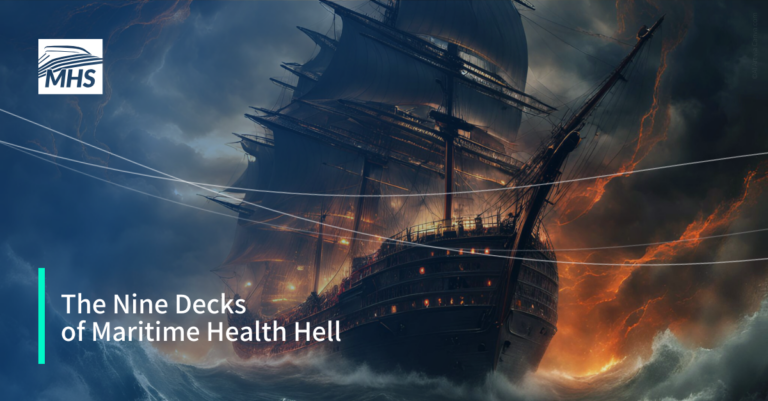In the world of maritime operations, maintaining high public health standards on board is as crucial as navigating the seas safely. Yet, despite rigorous guidelines and countless protocols, it’s all too easy to slip into practices that compromise the very safeguards meant to protect passengers, crew, and the communities visited. Inspired by Dante’s descent through the Nine Circles of Hell, this article explores the Nine Decks of Maritime Health Hell—each representing a layer of public health neglect or misstep that can arise in the pursuit of efficiency, convenience, or cost savings.
From the casual dismissal of health risks to the dangerous allure of quick fixes, each deck offers a humorous yet cautionary look at the realities of managing health at sea. These “decks” reveal the often-hidden pitfalls lurking within maritime operations, underscoring why public health in this sector requires more than just good intentions. Journey with us through these levels, where the stakes are high, shortcuts are tempting, and the consequences are all too real.
Table of Contents
Deck 9: The Deck of Denial (Limbo)
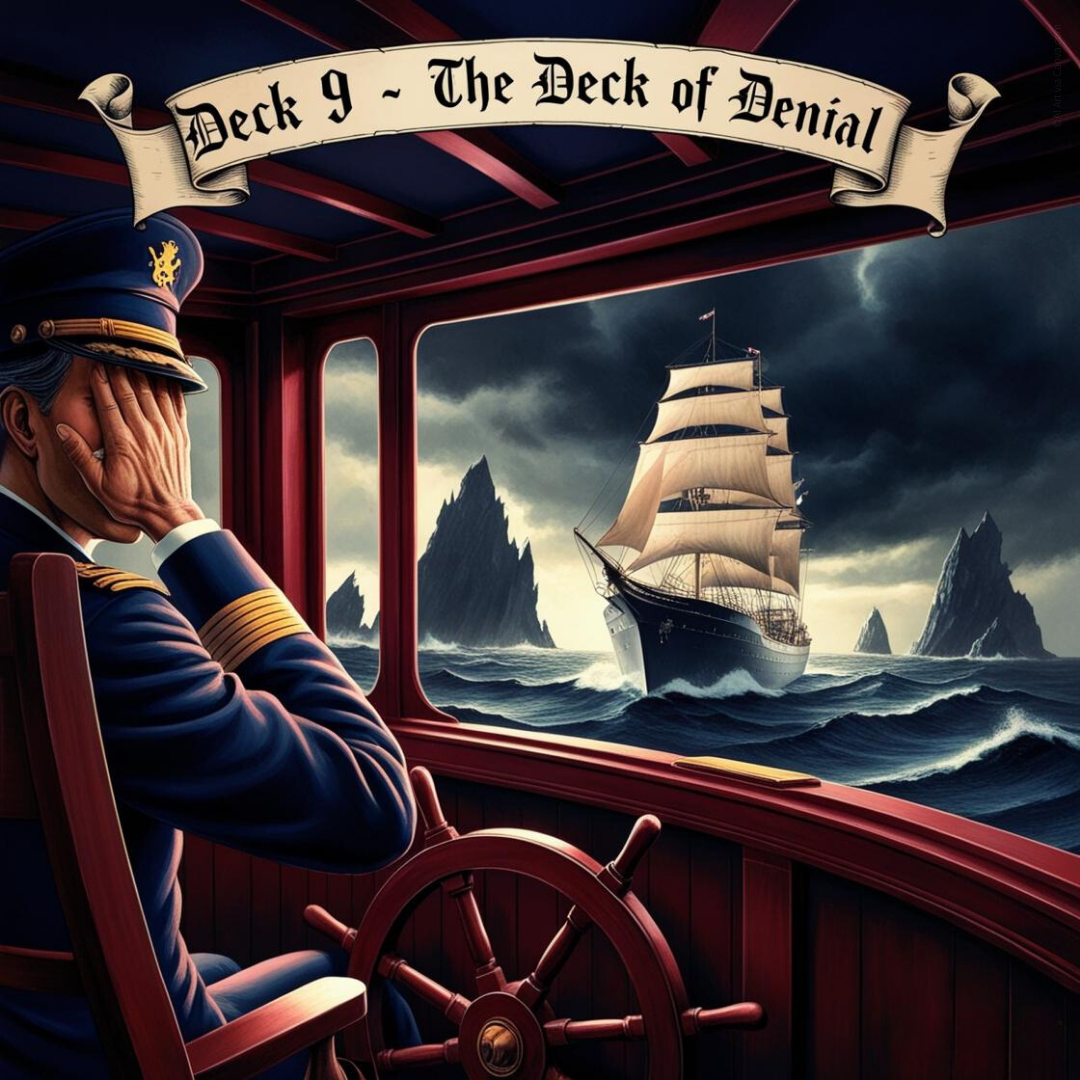
Welcome to the Deck of Denial, where health hazards are brushed off with blissful indifference. Vessel operators and crew stroll through this deck with an almost endearing confidence, utterly convinced that risks only apply to “other ships” or are exaggerated by overly cautious public health experts. There’s little room for “unnecessary” precautions like comprehensive Water Safety Plans, Allergen Control Programs, or stricter hot tub regulations—because why prepare for a crisis that “won’t happen on our ship?”
The residents of this deck are consummate optimists. Ask about disease outbreaks, and you’ll get a confident smile as they wave off such concerns, secure in the idea that their vessel is an oasis of immunity. It’s a charming attitude, right up until that first case of Legionnaires’ disease or norovirus outbreak drops anchor. Without any real contingency planning, this illusion of immunity quickly crumbles. In the end, limbo has a price, and the Reaper knows the budget. Those who linger too long on this deck may find themselves visited by consequences that are neither planned nor welcome.
Deck 8: The Deck of Quick Fixes (Lust)
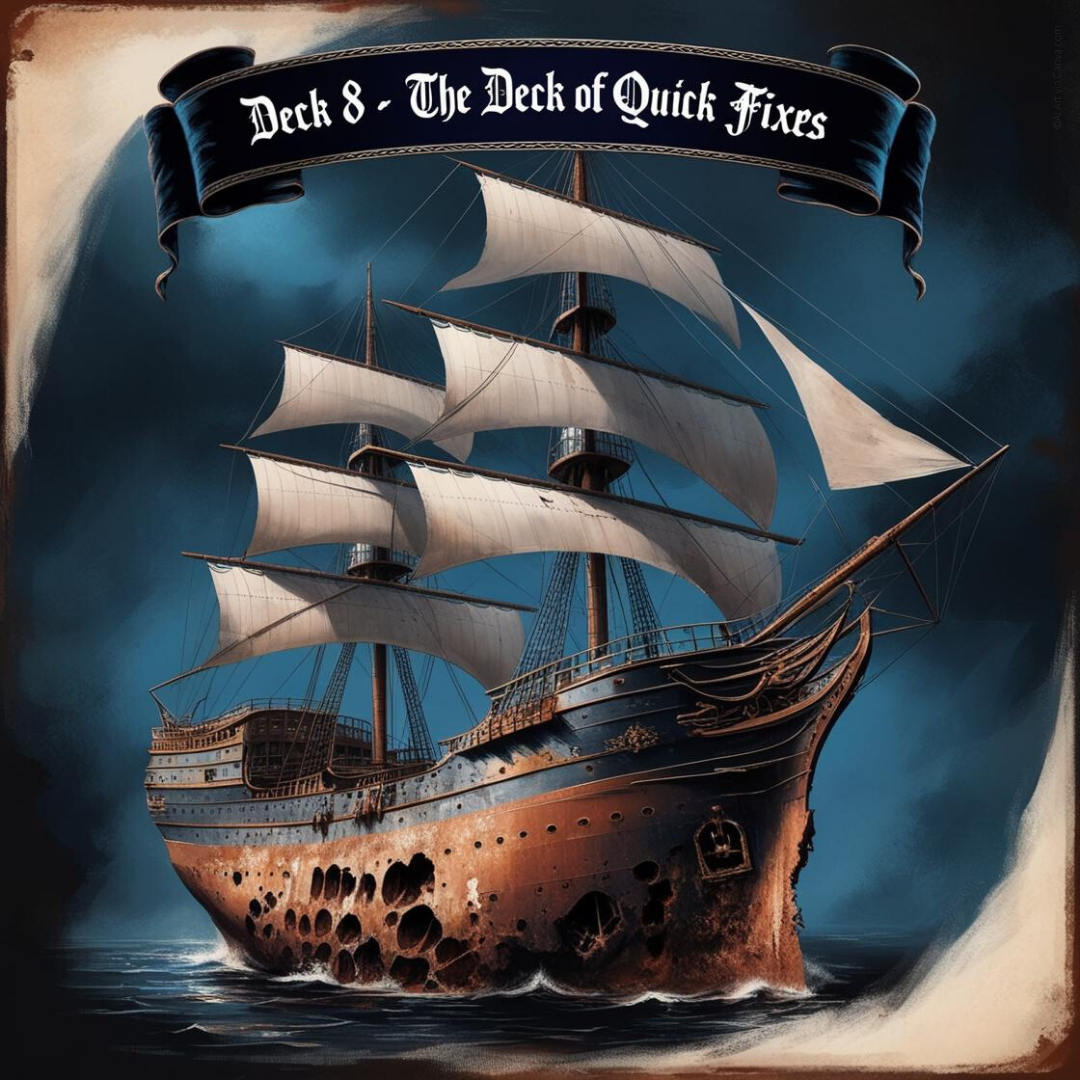
On the Deck of Quick Fixes, the lust for instant results often outweighs the drive for sustainable progress. Here, the focus is on surface-level solutions: hyperchlorinating the potable water system to combat Legionella (without investigating why the system is contaminated in the first place), applying pesticides on the first sighting of a fly, or implementing yet another checklist to address complex operational challenges. These quick fixes create a facade of a ship in tip-top shape, masking deeper issues and leaving critical health risks unaddressed.
On this deck, every task has a shortcut, and every shortcut has repercussions. Rather than investigating root causes, the emphasis is on “Band-Aid” solutions that merely create the appearance of hygiene and sanitation. Crew members know all the tricks—last-minute “deep cleans” before senior managers embark, creative food safety record-keeping, or hiding violations from health inspectors. Such actions may give the impression of efficiency, but they leave ships vulnerable to persistent health hazards that don’t respond to half-measures. This deck serves as a reminder that while quick fixes might save time today, they inevitably lead to much bigger headaches tomorrow.
Deck 7: The Deck of the Overtrained (Gluttony)
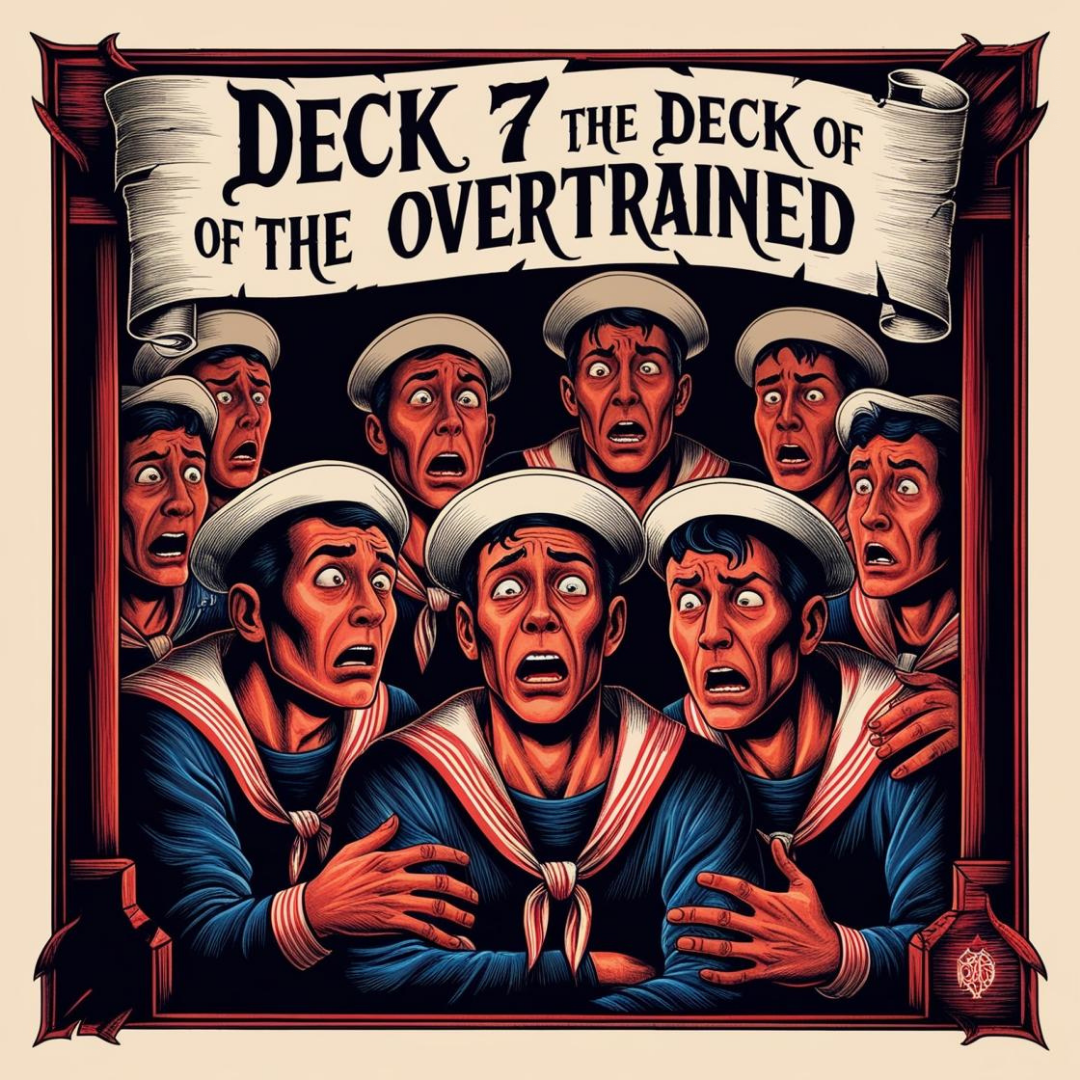
The Deck of the Overtrained is reserved for those that believe training is the silver bullet for every gap in performance or behavior. Seminars, workshops, and training sessions stack up like an all-you-can-eat buffet, filling schedules but delivering little in terms of practical skills. The logic is simple: more training must mean better performance. However, while training has its place, it rarely addresses the underlying causes behind recurring issues.
Crew members on this deck are inundated with facts and regulations but starved of practical insight. Endless PowerPoint slides on basic hygiene principles become just another compliance checkbox, rather than meaningful preparation for real-shipboard challenges. Critical skills—like effective pest management techniques or how to properly maintain recreational water facilities—remain elusive. Ironically, all this training leaves them overeducated in theory and underprepared in practice. This deck exemplifies how a gluttony for training doesn’t necessarily yield effective results.
Deck 6: The Deck of False Economy (Greed)
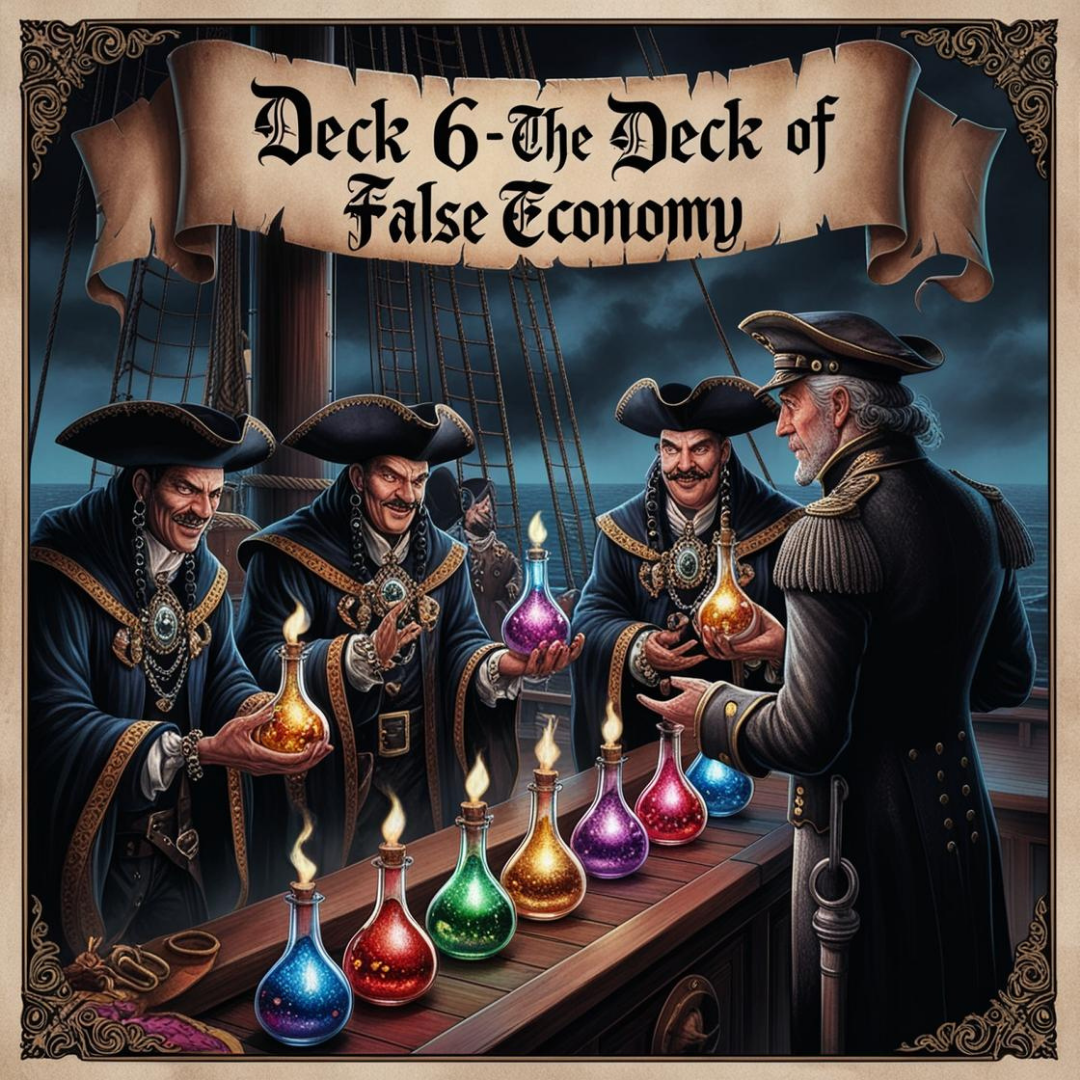
Step onto the Deck of False Economy, where greed masquerades as innovation and public health suffers for it. This is the deck where maritime operators find themselves seduced by the siren call of “game-changing” products, each promising to save time, money, and effort. It’s a playground for marketing hype, where service providers magically appear with their miracle solutions, like air purifiers that supposedly eliminate the need for manual cleaning or on board chlorine generator systems that profess to single-handedly prevent Legionella. The declarations are bold, but the science is often weak.
On this deck, shortcuts aren’t just endorsed—they’re sold. Vendors peddle a revolving door of “magic potions” that claim to fix complex public health challenges. Health budgets vanish into these fads, which apparently replace hands-on maintenance and tried-and-tested procedures, but in reality, leave critical safety gaps in their wake. For the price of a polished sales pitch, operators buy into a false sense of security, one that’s as fragile as it is dangerous. The true cost of this deck? A ship whose risks are only partially managed, proving that no gadget or shortcut can truly replace a robust public health culture.
Deck 5: The Deck of the Scapegoats (Anger)
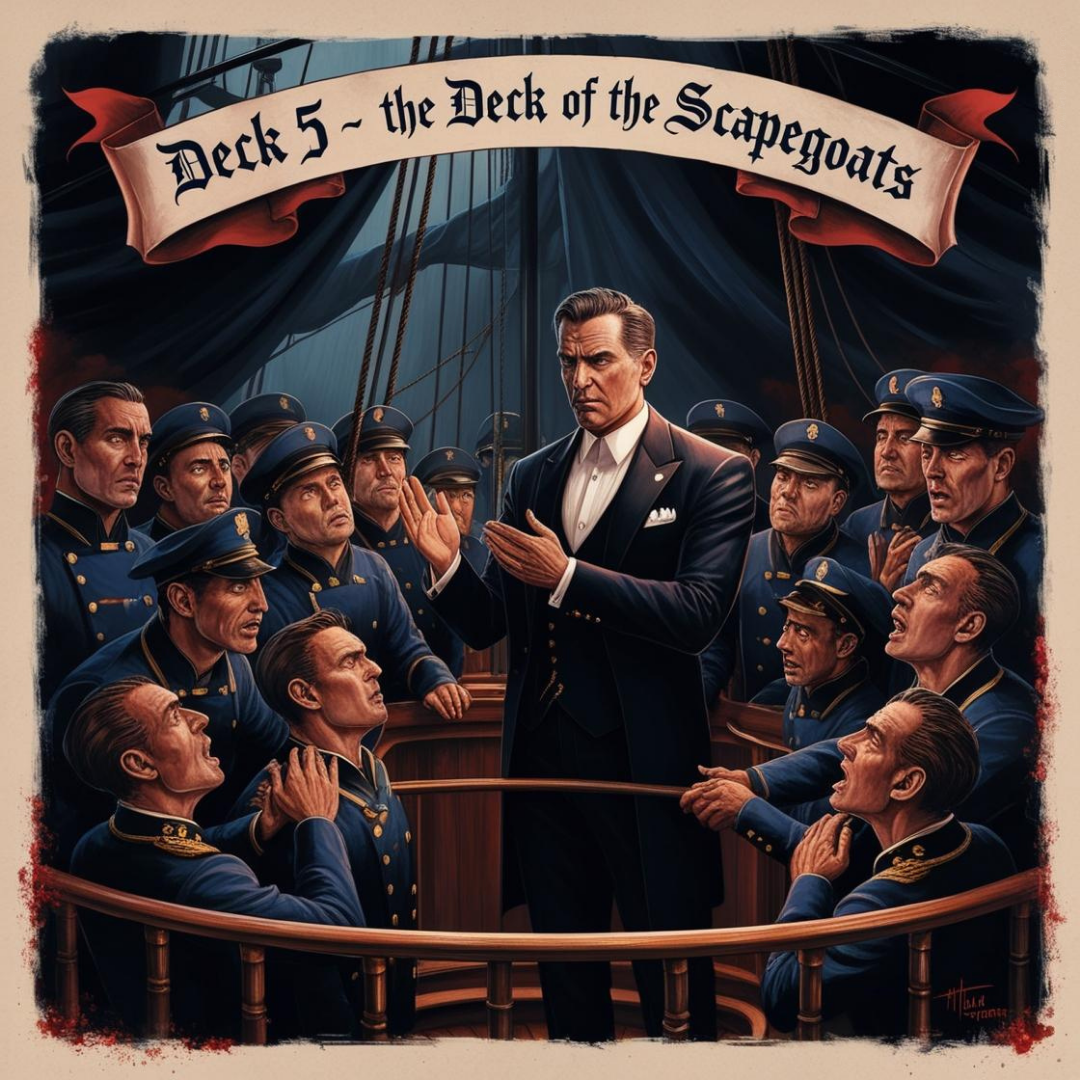
As we descend to the Deck of the Scapegoats, anger manifests as relentless finger-pointing, where crew members become the convenient scapegoat for every public health crisis. When outbreaks occur or inspections fail, the crew—often overworked and under-resourced—shoulders the blame, even if outdated policies or insufficient support are the real culprits. The tactic is familiar: deflecting issues onto those on board to avoid confronting deeper, systemic shortcomings.
However, this approach only fans the flames of maritime health hell. When blame is directed solely at the crew, it prevents real improvements and stifles morale. Without addressing the core issues, the cycle of frustration and declining standards only continues. Here, blame is cheap currency, fueling a culture that undermines trust and accountability, creating an environment that learns little from its mistakes.
Deck 4: The Deck of the Noncompliant (Heresy)
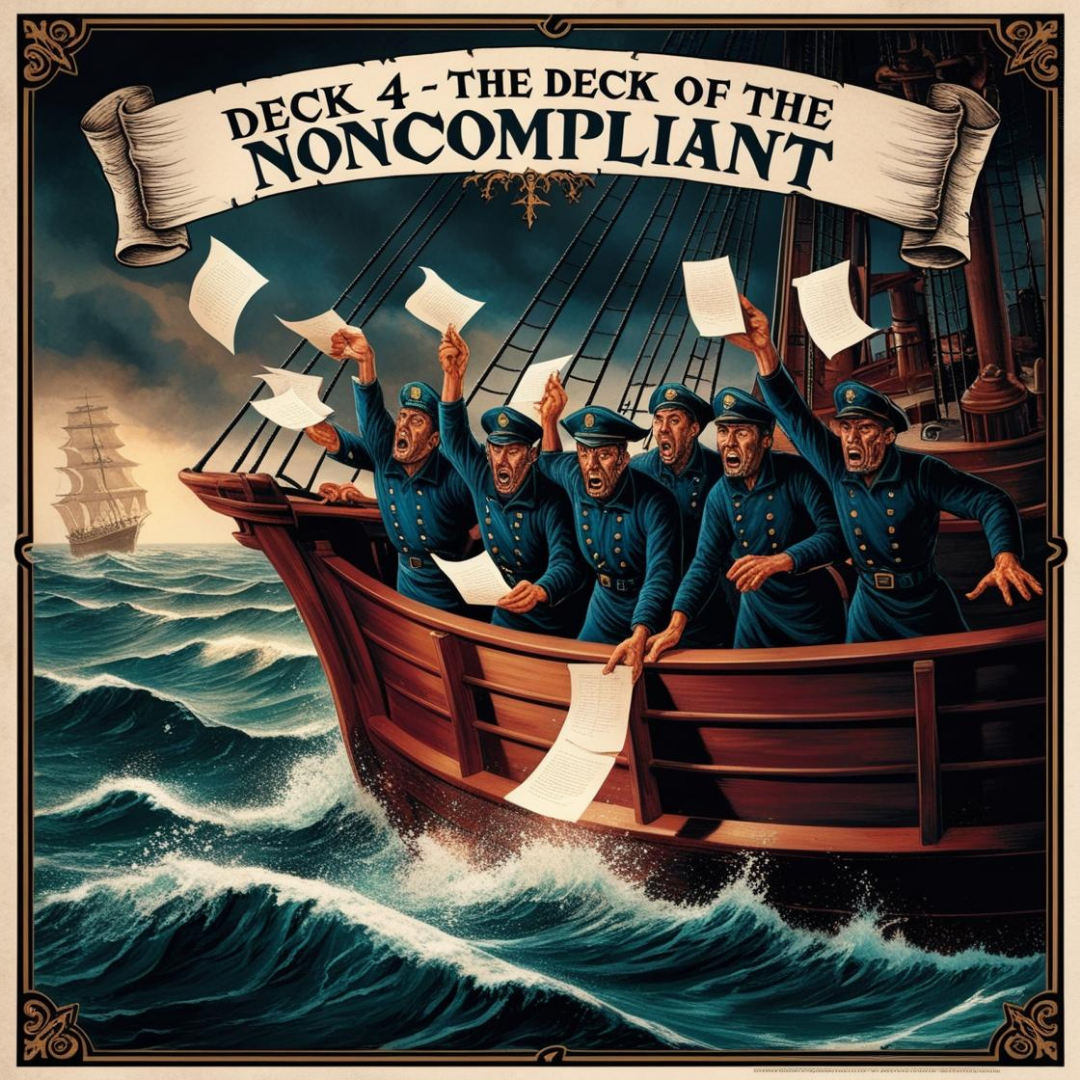
The Deck of the Noncompliant is where the mantra “we’ve always done it this way” reigns supreme, and public health regulations are treated as optional. Heresy thrives as health regulations are skirted for the sake of convenience. Whether it’s bypassing procedures to save time or only addressing public health when an inspection is looming, this is the deck where health and safety are loudly proclaimed as priorities, but actions say otherwise.
While this deck may offer the fleeting illusion of freedom from red tape, the consequences are inevitable and rarely far behind. The adage ‘What goes around, comes around’ is fitting, often taking the form of an outbreak, a failed inspection, or worse—loss of life. Maritime health is not a box-ticking exercise; plans that exist only on paper cannot mitigate real risks. Unfortunately, the true value of compliance is often realized only when it’s too late
Deck 3: The Deck of Violent Rejection (Violence)
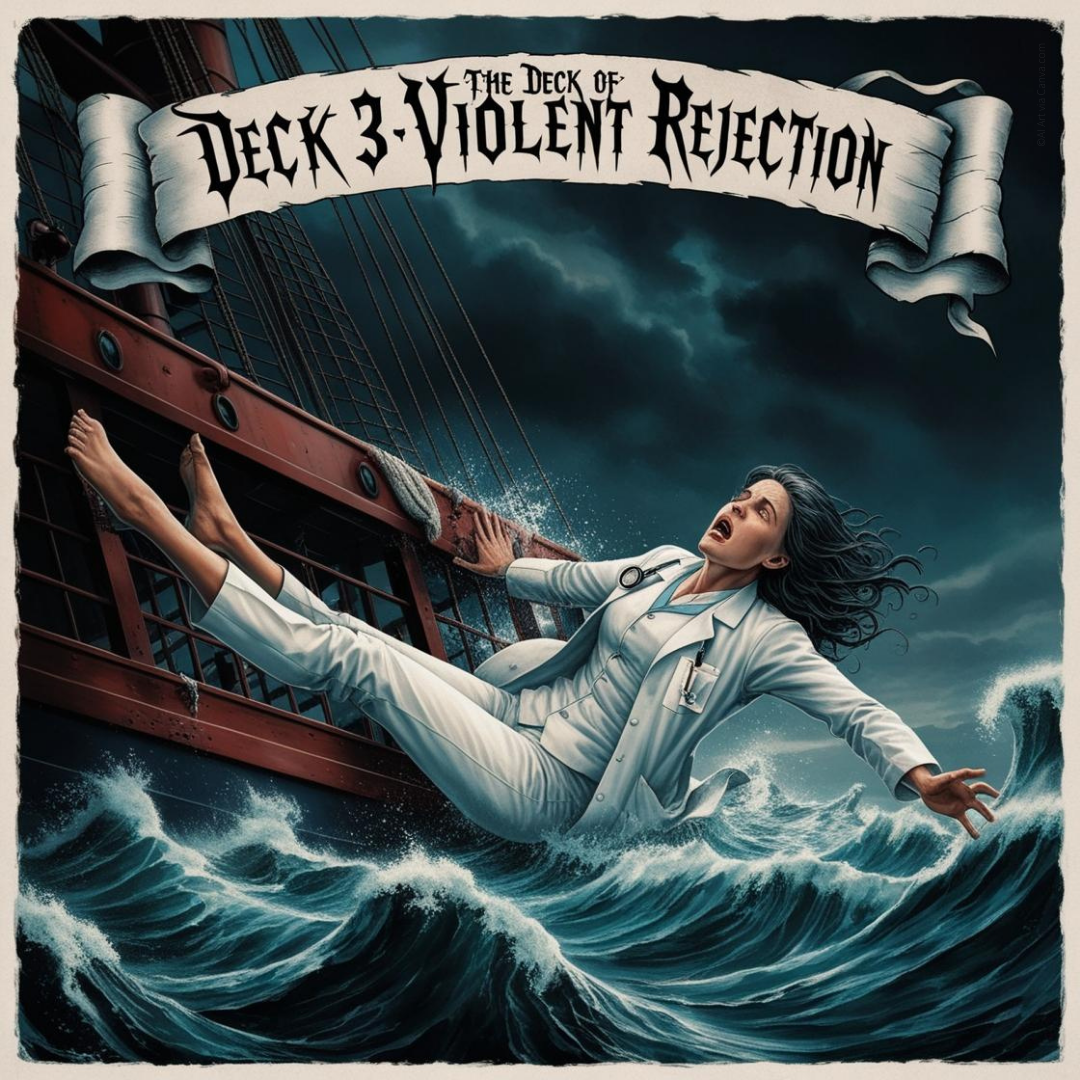
Descending to the Deck of Violent Rejection, we enter a realm where health protocols aren’t just ignored—they’re actively defied. Here, resistance is intentional, a calculated rejection of best practices that amounts to a violent assault on public health. Crew members willfully ignore disease reporting and isolation protocols, and skip basic hygiene steps like handwashing, each act a small rebellion, with those responsible fully aware of the potential consequences.
However, the defiance doesn’t end with the crew. Senior officers reinforce this culture, dismissing health concerns as “overcautious” and promoting a “we know best” mentality. Meanwhile, leadership ashore enables this disregard by allowing public health regulations to be bypassed or, at best, quietly overlooked. On this deck, the pervasive belief that public health measures can be dismissed without consequence creates a ticking time bomb—one that all too often detonates just as reality embarks.
Deck 2: The Deck of Non-Reporting (Fraud)
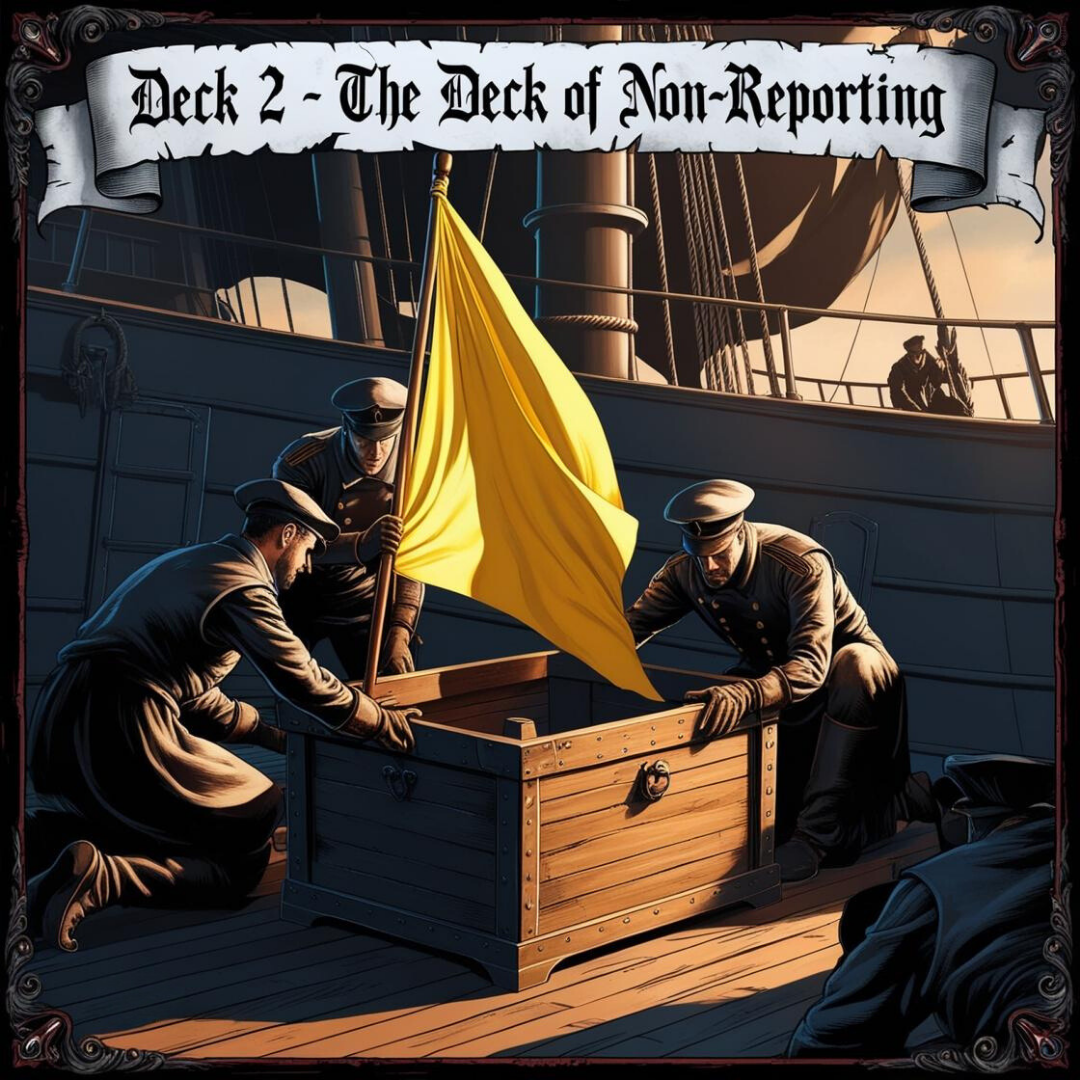
The air grows warmer as we step onto the Deck of Non-Reporting, where health risks are meticulously concealed behind a polished veneer. The unspoken rule here? ‘Out of sight, out of mind’—or perhaps, more aptly, ‘out of the logbook.’ Cases of infectious diseases like norovirus and COVID-19 are conveniently omitted or downplayed to avoid alarming health authorities or drawing media attention, allowing what could have been contained to spread unchecked.
This culture of concealment goes beyond simply omitting reports. Crew members are instructed to discreetly manage health incidents, while sanitation inspections are staged with theatrical precision to create a pristine image of compliance. This covert operation relies on selective record-keeping, strategic PR, and a ‘don’t ask, don’t tell’ approach. Here, fraud is more than just a tool to cover up adverse health events—it’s a lifeboat for a culture where maintaining appearances takes precedence over real health practices.
Deck 1: The Deck of the Doomed (Treachery)
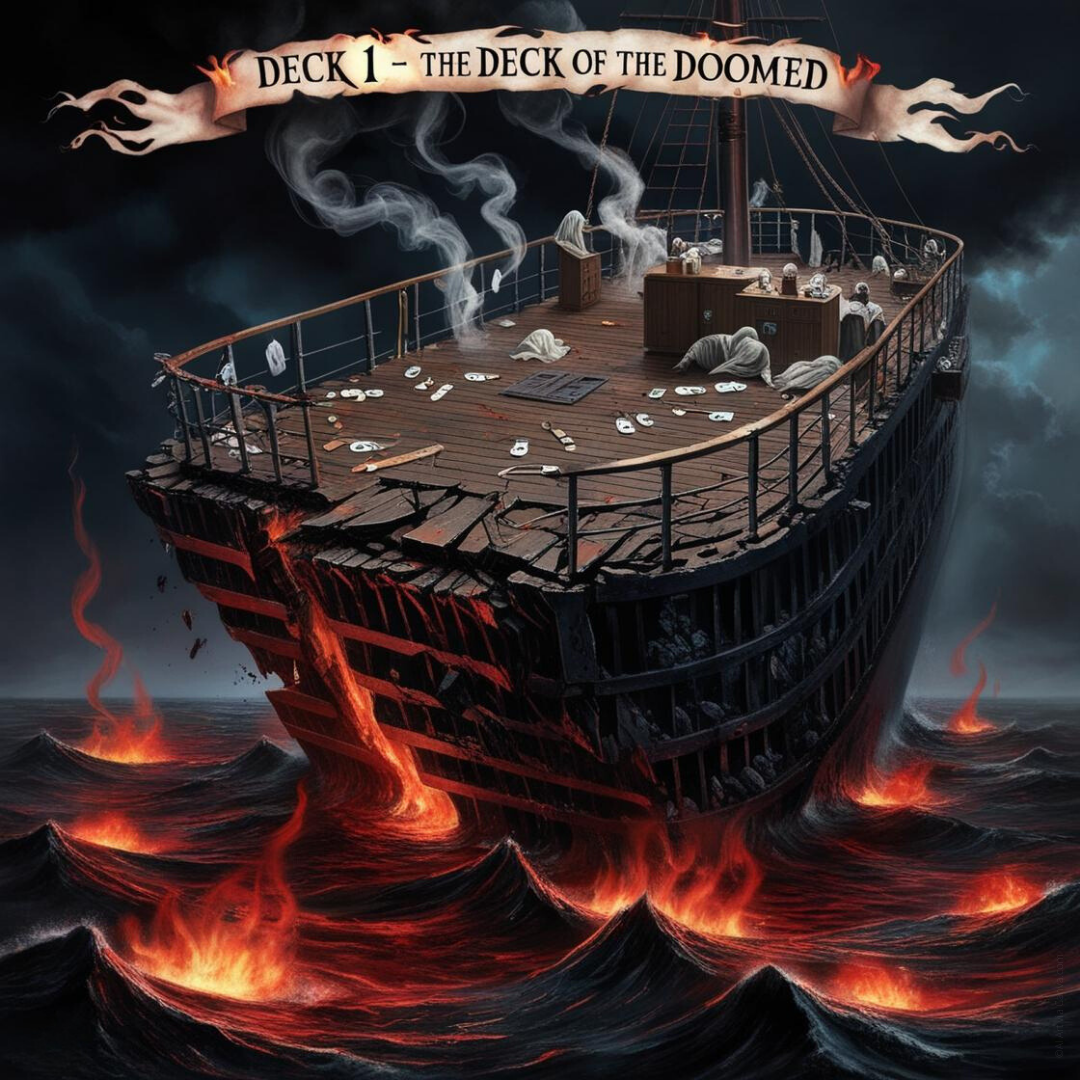
At the lowest level lies Deck 1, the Deck of the Doomed—where maritime health’s ultimate betrayers reside: public health and medical professionals who have sacrificed their principles for career gains, corporate profits, or simply to maintain the status quo. This deck represents true treachery, where those who understand the stakes make choices that compromise the health and safety of crew, passengers, and the local communities visited by their company’s vessels.
Instead of championing health and safety, the residents of this deck have become company politicians, navigating decisions with self-interest in mind, rather than the well-being they once vowed to protect. In times of crisis, they’re quick to deflect blame, expertly shifting responsibility to others. The Deck of the Doomed embodies the final, tragic irony—a place where commitment to maritime health has been neatly filed away under “business as usual,” and where career-driven ambitions are pursued at the expense of integrity. For those who belong on this deck, the consequences of their choices have finally come ashore, leaving a legacy as unsteady and compromised as the practices that brought them here.
Charting a New Course
As our journey through the Nine Decks of Maritime Health Hell comes to an end, we’re reminded that every misstep—from denial to deflection—is a path we can choose to leave behind. While it’s true that no system is perfect, the real strength lies in recognizing these pitfalls and making a commitment to change.
The maritime industry, like any other, is made up of people capable of learning, adapting, and striving for better standards. No matter how entrenched old approaches may seem, it’s never too late to correct our course toward safer, more accountable public health practices. After all, it’s this very commitment to improvement that propels our industry forward, one responsible step at a time.

